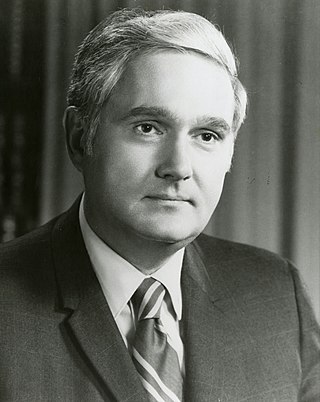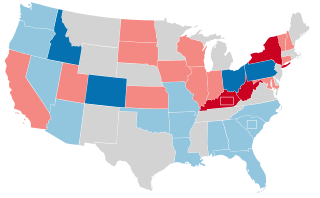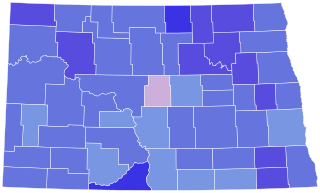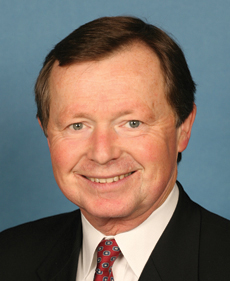
The 1986 United States Senate elections were elections for the United States Senate. Held on November 4, in the middle of Ronald Reagan's second presidential term, the 34 seats of Class 3 were contested in regular elections. The Republicans had to defend an unusually large number of freshman Senate incumbents who had been elected on President Ronald Reagan's coattails in 1980. Democrats won a net of eight seats, defeating seven freshman incumbents, picking up two Republican-held open seats, and regaining control of the Senate for the first time since January 1981. This remains the most recent midterm election in which the sitting president's party suffered net losses while still flipping a Senate seat.

The 1980 United States Senate elections were held on November 4, coinciding with Ronald Reagan's victory in the presidential election. The 34 Senate seats of Class 3 were contested in regular elections. Reagan's large margin of victory over incumbent Jimmy Carter gave a huge boost to Republican Senate candidates, allowing them to flip 12 Democratic seats and win control of the chamber for the first time since the end of the 83rd Congress in January 1955.

The 1968 United States Senate elections were elections for the United States Senate. Held on November 5, the 34 seats of Class 3 were contested in regular elections. They coincided with the presidential election of the same year. The Republicans picked up five net seats in the Senate. This saw Republicans win a Senate seat in Florida for the first time since Reconstruction.

The 1958 United States Senate elections were elections for the United States Senate which occurred in the middle of President Dwight D. Eisenhower's second term. Thirty-two seats of Class 1 were contested in regular elections, the new state of Alaska held its first Senate elections for its Class 2 and 3 seats, and two special elections were held to fill vacancies.

Mark Andrews was an American politician from the state of North Dakota. He was a member of the Republican Party and served as a U.S. senator.

The 1956 United States Senate elections were elections for the United States Senate that coincided with the re-election of President Dwight D. Eisenhower. The 32 seats of Class 3 were contested in regular elections, and three special elections were held to fill vacancies. Although Democrats gained two seats in regular elections, the Republicans gained two seats in special elections, leaving the party balance of the chamber unchanged.

The 1998 United States Senate election in North Dakota was held on November 3, 1998, along with other elections to the United States Senate as well as elections to the United States House of Representatives and various state and local elections. Incumbent Democratic-NPL U.S. Senator Byron Dorgan won re-election to a second term.

The 1986 United States Senate election in North Dakota was held on November 4, 1986. Incumbent Republican U.S. Senator Mark Andrews ran for re-election to a second term, but was defeated by Democratic-NPL nominee Kent Conrad.

The 1982 U.S. Senate election for the state of North Dakota was held November 2, 1982. The incumbent, North Dakota Democratic NPL Party (Dem-NPL) Senator Quentin Burdick, sought and received re-election to his fifth term, defeating Republican candidate Gene Knorr.

The 1976 U.S. Senate election for the state of North Dakota was held November 2, 1976. The incumbent, North Dakota Democratic NPL Party (Dem-NPL) Senator Quentin Burdick, sought and received re-election to his fourth term to the United States Senate, defeating Republican candidate Robert Stroup.

The state and local elections in North Dakota in 2006 proceeded as follows:

The 1974 United States Senate election in North Dakota was held November 5, 1974. Incumbent Republican U.S. Senator Milton Young was narrowly reelected to his sixth term, defeating Democratic-NPL candidate William L. Guy.

The 1962 U.S. Senate election for the state of North Dakota was held November 6, 1962. The incumbent, Republican Senator Milton Young, sought and received re-election to his fourth term, defeating North Dakota Democratic-NPL Party candidate William Lanier of Fargo, North Dakota.

The 1956 U.S. Senate election in North Dakota was held November 6, 1956. The incumbent, Republican Senator Milton Young, sought and received re-election to his third term, defeating North Dakota Democratic-NPL Party candidate Quentin N. Burdick, son of North Dakota congressman Usher L. Burdick.

The 2004 U.S. House of Representatives election for the state of North Dakota's at-large congressional district was held November 2, 2004. The incumbent, Democratic-NPL Congressman Earl Pomeroy was re-elected to his seventh term, defeating Republican candidate Duane Sand.

North Dakota held two statewide elections in 2016: a primary election on Tuesday, June 14, and a general election on Tuesday, November 8. In addition, each township elected officers on Tuesday, March 15, and each school district selected a date between April 1 and June 30 to hold their elections. This would have been the first election since the state legislature revoked the ability to use a student or military ID to satisfy state ID voting requirements, but a court ruling in August struck the down the provision, and the election was held under the 2013 rules.

The state of North Dakota held a series of elections on November 6, 2012. In addition to selecting presidential electors, North Dakotan voters selected one of its two United States Senators and its lone United States Representative, as well as seven statewide executive officers and one Supreme Court Justice. Primary elections were held on June 12, 2012.

North Dakota held two statewide elections in 2018: a primary election on Tuesday, June 12, and a general election on Tuesday, November 6. In addition, each township elected officers on Tuesday, March 20, and each school district held their elections on a date of their choosing between April 1 and June 30.

The 2022 United States Senate election in North Dakota was held on November 8, 2022, to elect a member of the United States Senate to represent the state of North Dakota. Incumbent Republican John Hoeven was first elected in 2010 with 76% of the vote to succeed retiring Democratic–NPL incumbent Byron Dorgan, and won re-election in 2016 with 78.5% of the vote. He ran for a re-election to a third term in office against Democratic-NPL nominee Katrina Christiansen.

The 2022 United States House of Representatives election in North Dakota was held on November 8, 2022, to elect the U.S. representative from North Dakota's at-large congressional district. The election coincided with other elections to the House of Representatives, elections to the United States Senate and various state and local elections. Incumbent Republican Kelly Armstrong was re-elected with 69.0% of the vote in 2020. His only opponent in the general election was Independent Cara Mund after Democratic nominee Mark Haugen withdrew.




















